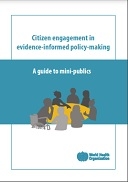
Author(s): World Health Organization
Resource Type: Books
Keywords: Citizen Engagement, Community Participation, Policy-making, Inclusive Development
Citizen engagement in evidence-informed policy-making a guide to mini-publics
The guide focuses on mini-publics, which are forums involving a cross-section of the population chosen through civic lottery for evidence-informed deliberation, aimed at informing policy and action. Mini-publics represent various democratic innovations for engaging citizens in policymaking. The guide outlines how to organize mini-publics in the health sector, offering practical advice for implementing citizen engagement within evidence-informed policy-making, aligned with the World Health Organization's mission for universal health coverage.
It introduces mini-publics as a form of citizen engagement across different stages of the policy process, such as idea generation, option assessment, and policy evaluation. The guide details two common types of mini-publics: Citizens' Juries/Panels and Citizens' Assemblies, emphasizing their shared features like participant selection through civic lottery, support for meaningful participation, evidence-informed deliberation, and skilled facilitation.
The process of organizing a mini-public is divided into four stages: Inception, Preparation, Deliberation, and Influence. Each stage involves specific steps to achieve desired outputs, such as forming project teams, recruiting participants, preparing evidence, designing deliberation sessions, and evaluating outcomes. The Influence stage focuses on promoting the mini-public report to inform policy and action, as well as evaluating its impact.
Furthermore, the guide emphasizes that mini-publics are more than just technical projects; they are social practices that build relationships and trust to facilitate inclusive deliberations. It underscores the importance of collaborative efforts among citizens, community groups, civil society organizations, and public institutions to embed citizen engagement in evidence-informed policymaking equitably. Ultimately, integrating citizen engagement into policymaking processes can significantly contribute to addressing public health challenges in diverse social, economic, and political contexts.